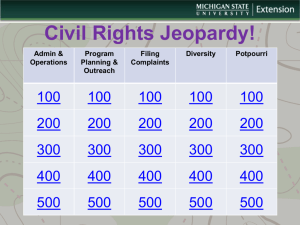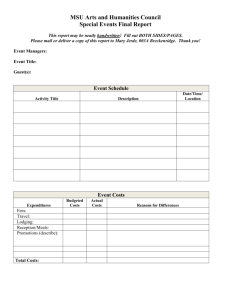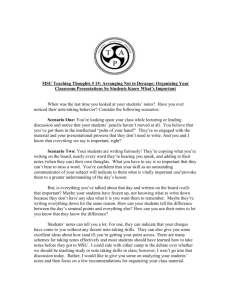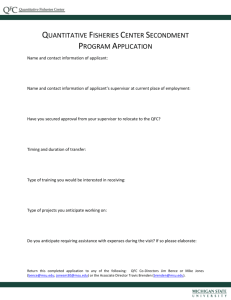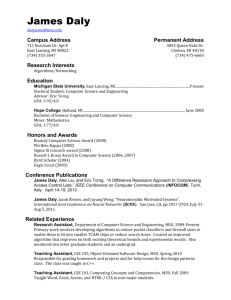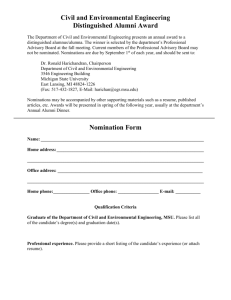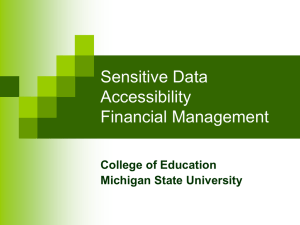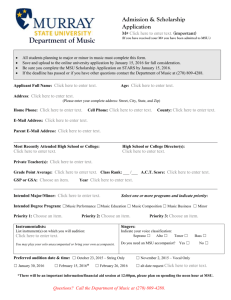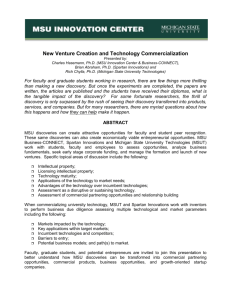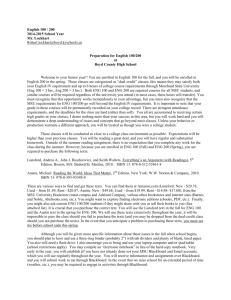Syllabus - Michigan State University
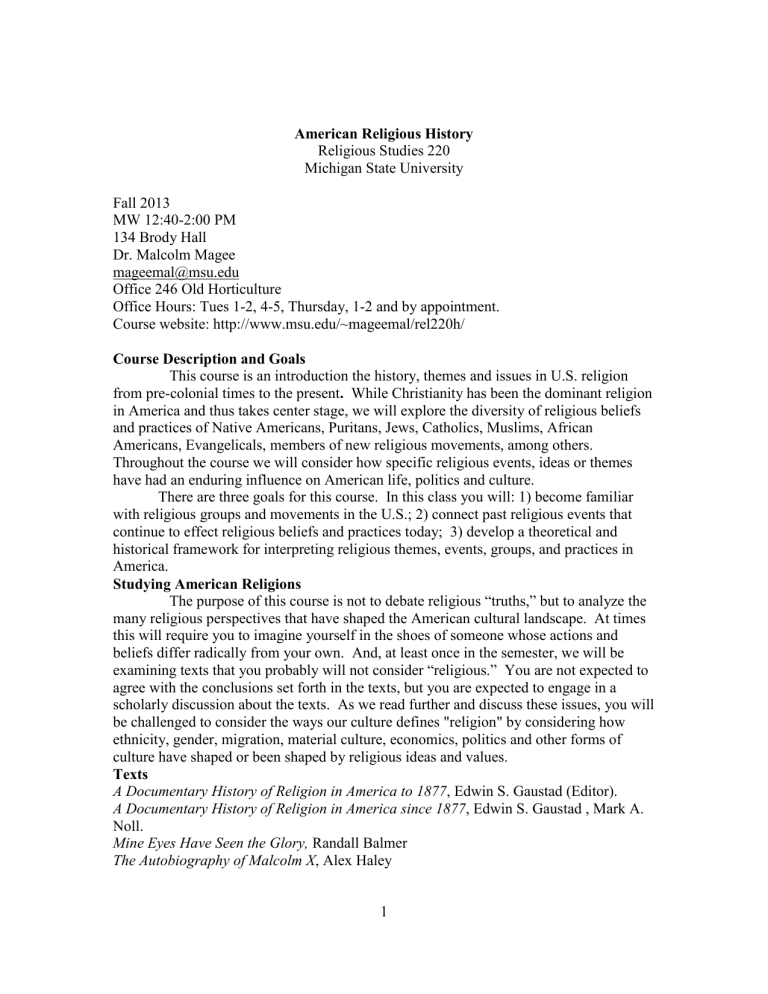
American Religious History
Religious Studies 220
Michigan State University
Fall 2013
MW 12:40-2:00 PM
134 Brody Hall
Dr. Malcolm Magee mageemal@msu.edu
Office 246 Old Horticulture
Office Hours: Tues 1-2, 4-5, Thursday, 1-2 and by appointment.
Course website: http://www.msu.edu/~mageemal/rel220h/
Course Description and Goals
This course is an introduction the history, themes and issues in U.S. religion from pre-colonial times to the present . While Christianity has been the dominant religion in America and thus takes center stage, we will explore the diversity of religious beliefs and practices of Native Americans, Puritans, Jews, Catholics, Muslims, African
Americans, Evangelicals, members of new religious movements, among others.
Throughout the course we will consider how specific religious events, ideas or themes have had an enduring influence on American life, politics and culture.
There are three goals for this course. In this class you will: 1) become familiar with religious groups and movements in the U.S.; 2) connect past religious events that continue to effect religious beliefs and practices today; 3) develop a theoretical and historical framework for interpreting religious themes, events, groups, and practices in
America.
Studying American Religions
The purpose of this course is not to debate religious “truths,” but to analyze the many religious perspectives that have shaped the American cultural landscape. At times this will require you to imagine yourself in the shoes of someone whose actions and beliefs differ radically from your own. And, at least once in the semester, we will be examining texts that you probably will not consider “religious.” You are not expected to agree with the conclusions set forth in the texts, but you are expected to engage in a scholarly discussion about the texts. As we read further and discuss these issues, you will be challenged to consider the ways our culture defines "religion" by considering how ethnicity, gender, migration, material culture, economics, politics and other forms of culture have shaped or been shaped by religious ideas and values.
Texts
A Documentary History of Religion in America to 1877 , Edwin S. Gaustad (Editor).
A Documentary History of Religion in America since 1877 , Edwin S. Gaustad , Mark A.
Noll.
Mine Eyes Have Seen the Glory, Randall Balmer
The Autobiography of Malcolm X , Alex Haley
1
Course Requirements
Your final grade will be determined by the following:
First Exam: 25%
Second Exam: 25%
Response Paper: 25%
Individual Religious History: 25%
Exams (50%)
The First exam (10/7/13) and Second exam (12/4/13) will be blue book exams that consist of identifications and essays.
Response Paper (25%)
You will write a response paper (4-6 pages), that record your responses to an assigned text or another text from a list I will give you. The papers are due at the beginning of the final exam period Monday Dec. 9, 12:45. Here are a few general guidelines for the paper:
1) Each paper must be typed, double-spaced, 12-point font, with a title.
2) Include the title of the reading(s) to which you are responding.
3) Always keep a copy for yourself.
4) Follow general writing conventions.
5) No late papers will be accepted.
Individual religious history (25%)
This 5-7 page paper is due 10/14/13 at the beginning of class. The purpose of this project is for you to write about your family's religious history and how your history fits into American religious history. This is a two-part writing project that will require some research. Start by identifying your family's religious affiliation or tradition. If it appears that your immediate family has no particular religious commitments, interview family members about earlier generations and their religious beliefs and practices. Once you have identified a religious connection in your family (or perhaps many conflicting beliefs and practices), describe it in as much detail as possible. Second, locate your family's tradition within the larger context of American religious history. Where do your family and the members' religious beliefs and practices fit? Using readings and your lecture notes from this course, explain how you family's religious history is part of
American religious history. See guidelines on last page of this syllabus.
General Reference Books
Charles H. Lippy and Peter W. Williams, editors. Encyclopedia of the American
Religious Experience : Studies of Traditions and Movements (New York : Scribner,
1988). Call # BL2525 .E53 SOC SCI HUMANITIES REF copy 1 v. 1-3
Edward L. Queen II, Stephen R. Prothero, and Gardiner H. Shattuck, Jr., eds.
The Encyclopedia of American Religious History (New York : Facts On File, 1996).
Call # BL2525 .Q44 SOC SCI HUMANITIES REF copy 1 v. 1-2
Writing Resources
Chicago Manual of Style http://www.bedfordbooks.com/rd/ctchicago.html
Strunk and White, Elements of Style http://www.cc.columbia.edu/acis/bartleby/strunk/
MSU Writing Center http://writing.msu.edu/
MSU Grammar Hotline Grammar@pilot.msu.edu
2
Academic Integrity
All the work that you submit for this course falls under the academic integrity umbrella. Therefore, you must provide citations for ideas, quotes, paraphrases, etc. that you include in your papers. Neglecting to cite sources or copying someone else's intellectual ideas is plagiarism and will result in a failing grade for the course . If at any time throughout the semester you have a question about citing a source, please ask me.
Class Schedule: [Subject to change]
Wk 1 Introduction
Wk 2 Catholics Imagine the New World
Wk2 Protestants Imagine the New World
Wk 3 Puritans
Wk 4 Religion, Revolution and American Identity
Wk 5 Native American Traditions/ Sacred space/ Spiritual epistemology.
Wk 6 Evangelical Revivals and Native Americans
Wk 7 Reform Movements/Temperance/Slavery
Wk 8 Religion and the Civil war
Wk 9 Gilded Age Religion
Wk 10 Judaism
Wk 11 Political Religion
Wk 12 Political Religion (cont.)
Wk 13 American Islam
Wk 14 American Religion/Popular Culture
Wk 15 Conclusion
FINAL EXAM: Monday Dec. 9, 12:45
3
